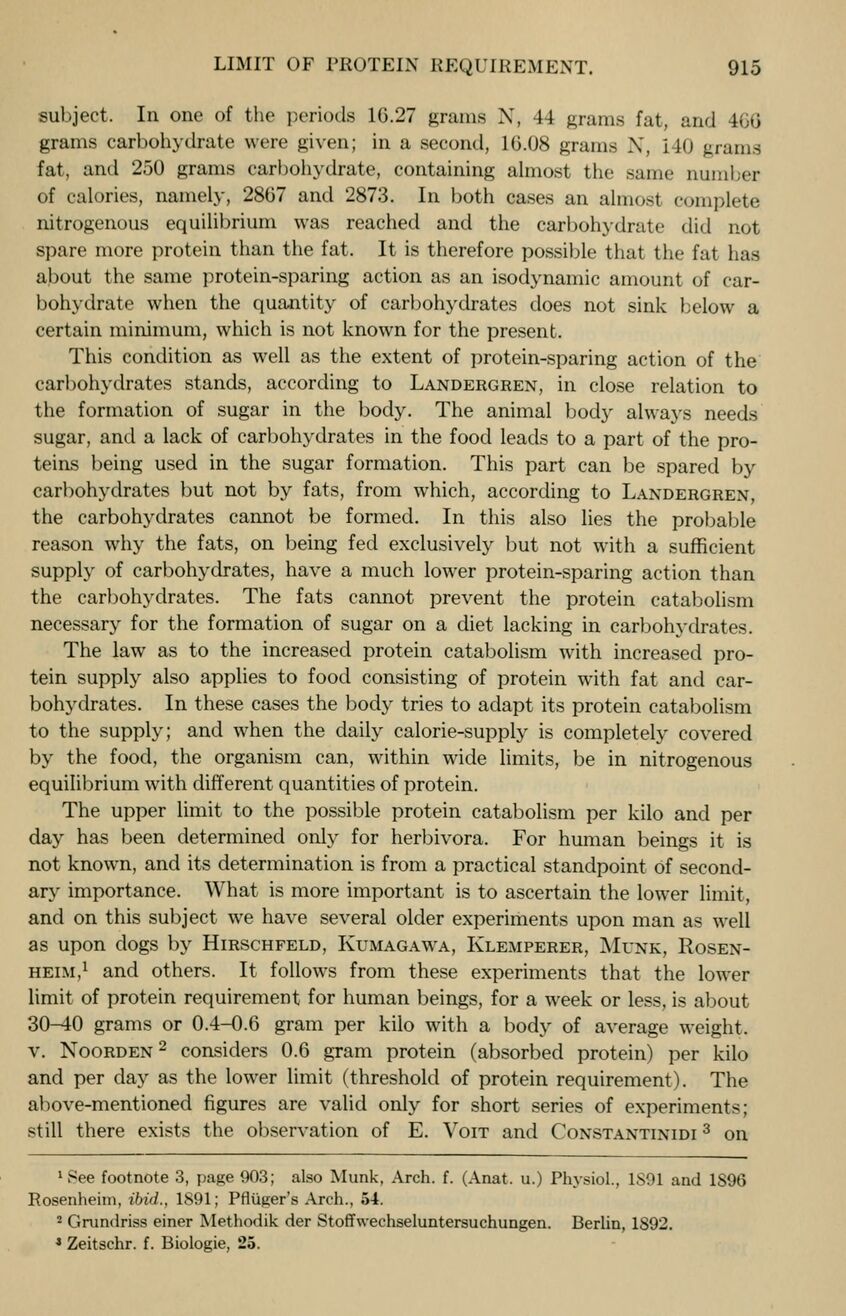
Full resolution (JPEG) - On this page / på denna sida - XVII. Metabolism - III. Metabolism with various Foods

<< prev. page << föreg. sida << >> nästa sida >> next page >>
Below is the raw OCR text
from the above scanned image.
Do you see an error? Proofread the page now!
Här nedan syns maskintolkade texten från faksimilbilden ovan.
Ser du något fel? Korrekturläs sidan nu!
This page has never been proofread. / Denna sida har aldrig korrekturlästs.
LIMIT OF PROTEIN REQUIREMENT. 915
subject. In one of the periods 16.27 grams X, 14 grama fat, and 166
grains carbohydrate were given; in a second, Hi. (is grams X, 1 10 grama
fat, and 250 grams carbohydrate, containing almost the .same number
of calorics, namely, 2807 and 2873. In both cases an almoal complete
nitrogenous equilibrium was reached and the carbohydrate did not
spare more protein than the fat. It is therefore possible that the fat has
about the same protein-sparing action as an isodynamic amount of car-
bohydrate when the quantity of carbohydrates does not sink below a
certain minimum, which is not known for the present.
This condition as well as the extent of protein-sparing action of the
carbohydrates stands, according to Landergren, in close relation to
the formation of sugar in the body. The animal bod}- always needs
sugar, and a lack of carbohydrates in the food leads to a part of the pro-
teins being used in the sugar formation. This part can be spared by
carbohydrates but not by fats, from which, according to Landergren,
the carbohydrates cannot be formed. In this also lies the probable
reason why the fats, on being fed exclusively but not with a sufficient
supply of carbohydrates, have a much lower protein-sparing action than
the carbohydrates. The fats cannot prevent the protein catabolism
necessary for the formation of sugar on a diet lacking in carbohydrates.
The law as to the increased protein catabolism with increased pro-
tein supply also applies to food consisting of protein with fat and car-
bohydrates. In these cases the body tries to adapt its protein catabolism
to the supply; and when the daily calorie-supply is completely covered
by the food, the organism can, within wide limits, be in nitrogenous
equilibrium with different quantities of protein.
The upper limit to the possible protein catabolism per kilo and per
day has been determined only for herbivora. For human beings it is
not known, and its determination is from a practical standpoint of second-
ary importance. What is more important is to ascertain the lower limit,
and on this subject we have several older experiments upon man as well
as upon dogs by Hirschfeld, Kumagawa, Klemperer, Munk, Rosen-
heim, 1
and others. It follows from these experiments that the lower
limit of protein requirement for human beings, for a week or less, is about
30-40 grams or 0.4-0.6 gram per kilo with a body of average weight,
v. Noorden 2
considers 0.6 gram protein (absorbed protein) per kilo
and per day as the lower limit (threshold of protein requirement). The
above-mentioned figures are valid only for short series of experiments;
still there exists the observation of E. Voit and Constantinidi 3
on
1
See footnote 3, page 903; also Munk, Arch. f. (Anat. u.) Physiol., 1S91 and 1896
Rosenheim, ibid., 1891; Pfluger’s Arch., 54.
2
Grundriss einer Methodik der Stoffwechseluntersuchungen. Berlin, 1892.
* Zeitschr. f. Biologie, 2a.
<< prev. page << föreg. sida << >> nästa sida >> next page >>